Unit 9 Can you come to my party?复习课件(共36张PPT)
文档属性
| 名称 | Unit 9 Can you come to my party?复习课件(共36张PPT) | 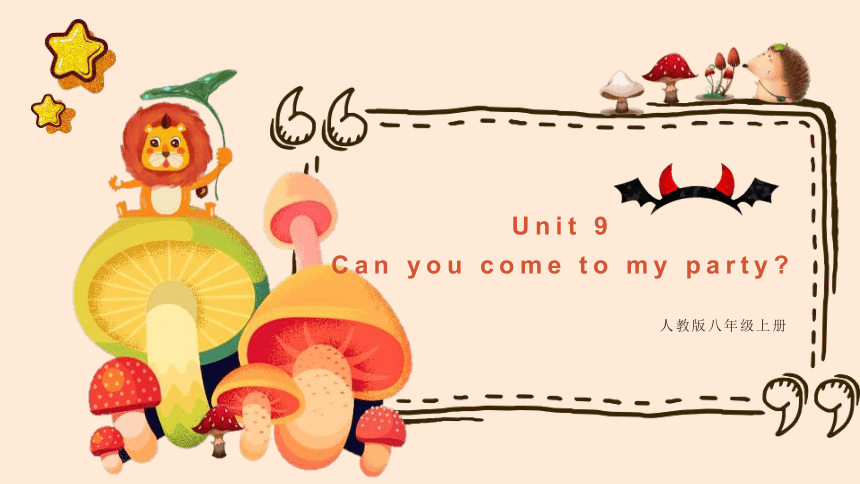 | |
| 格式 | zip | ||
| 文件大小 | 1.4MB | ||
| 资源类型 | 教案 | ||
| 版本资源 | 人教新目标(Go for it)版 | ||
| 科目 | 英语 | ||
| 更新时间 | 2021-12-03 16:19:43 | ||
图片预览

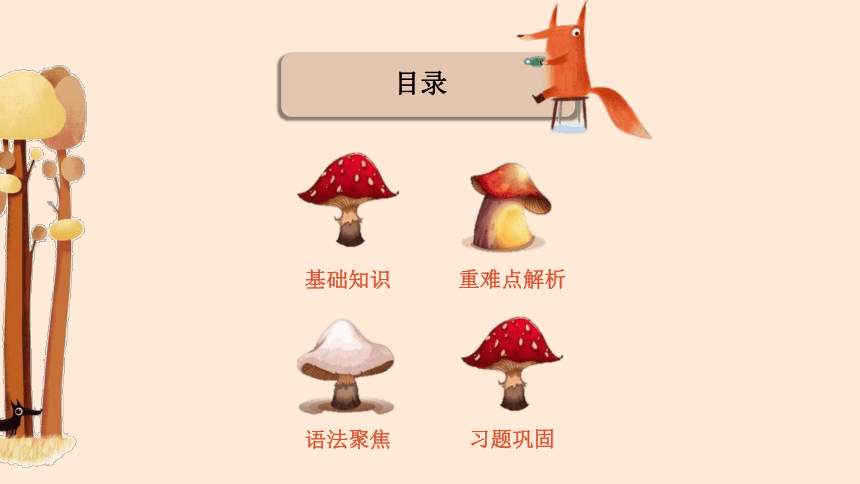

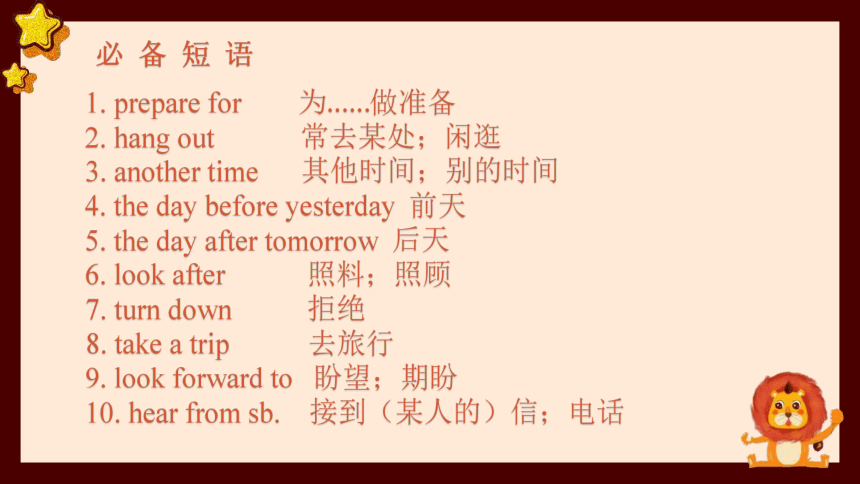
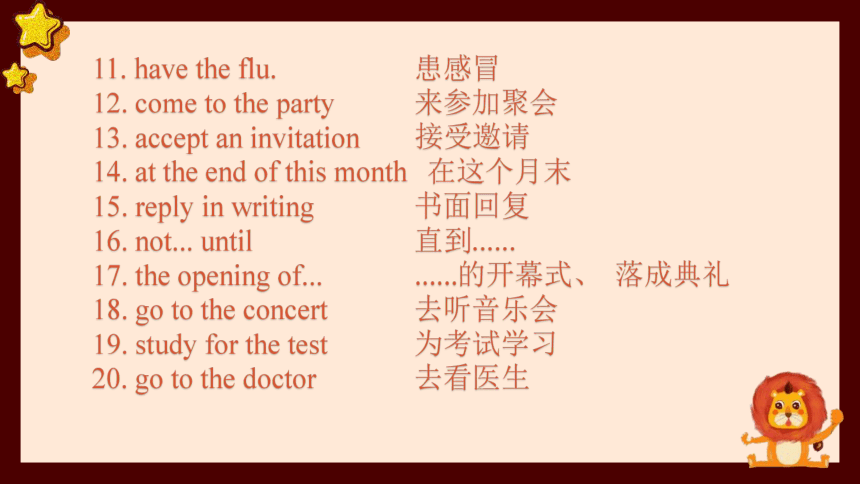
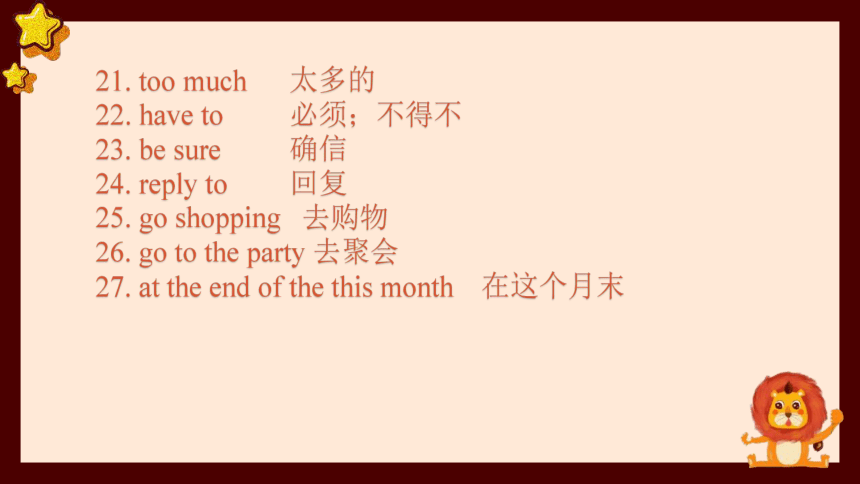
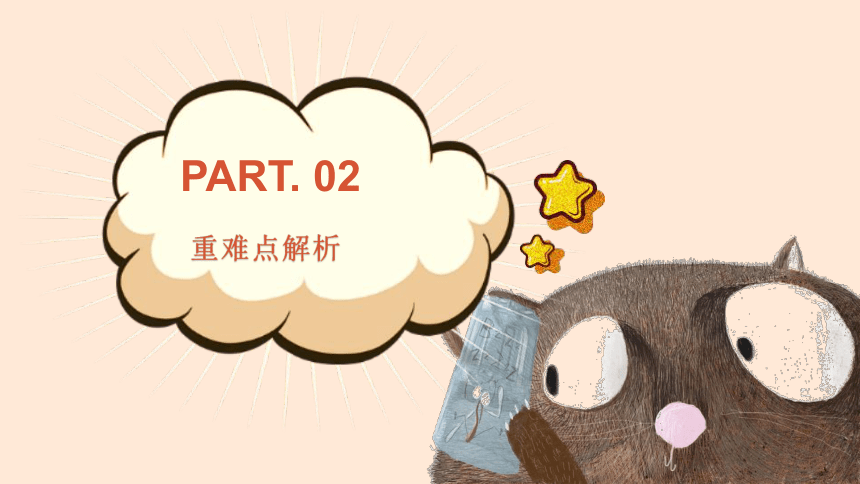
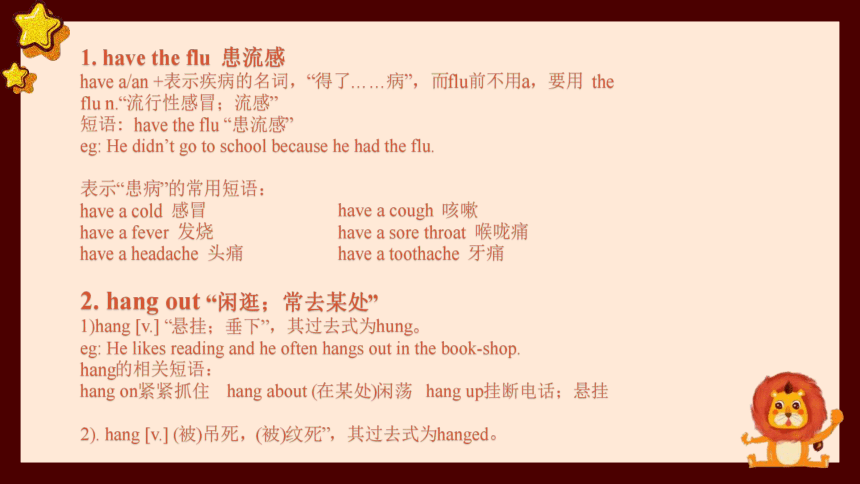
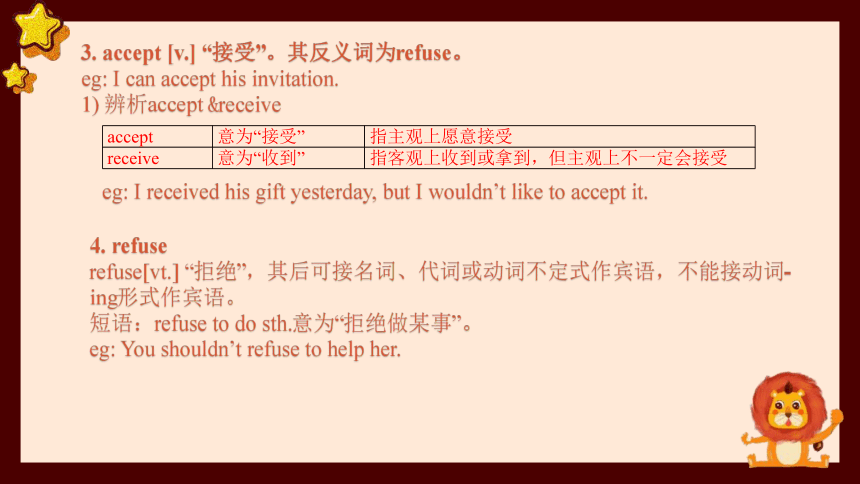
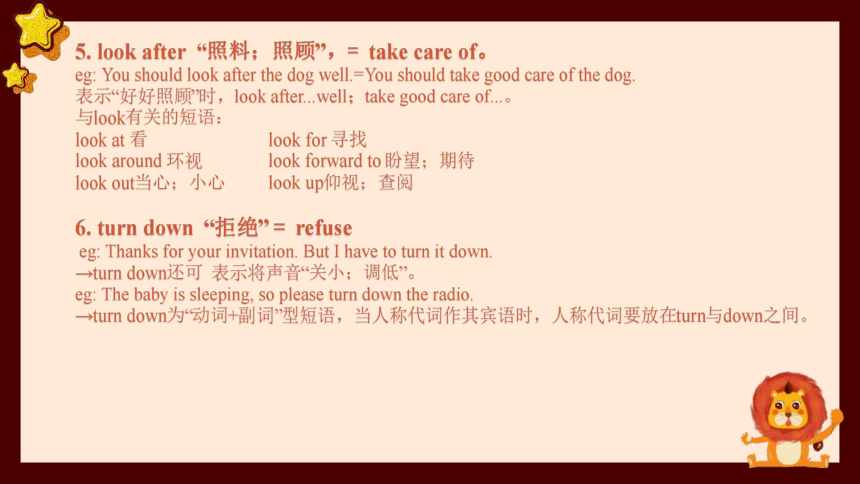
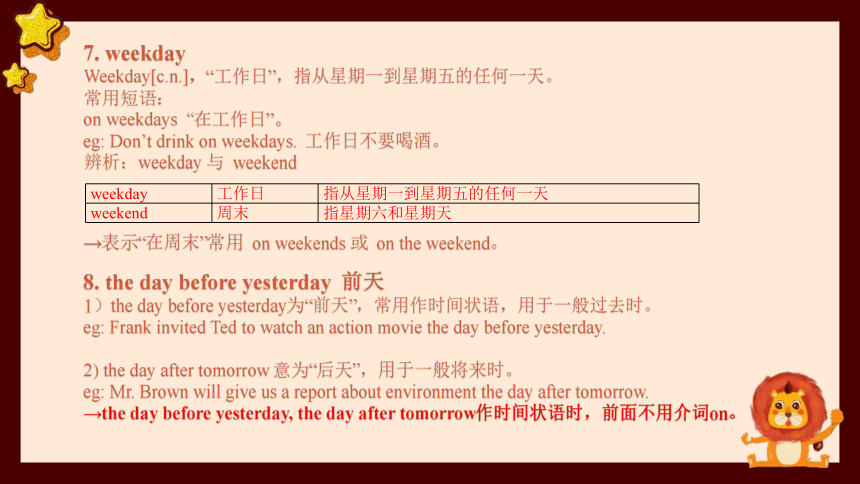
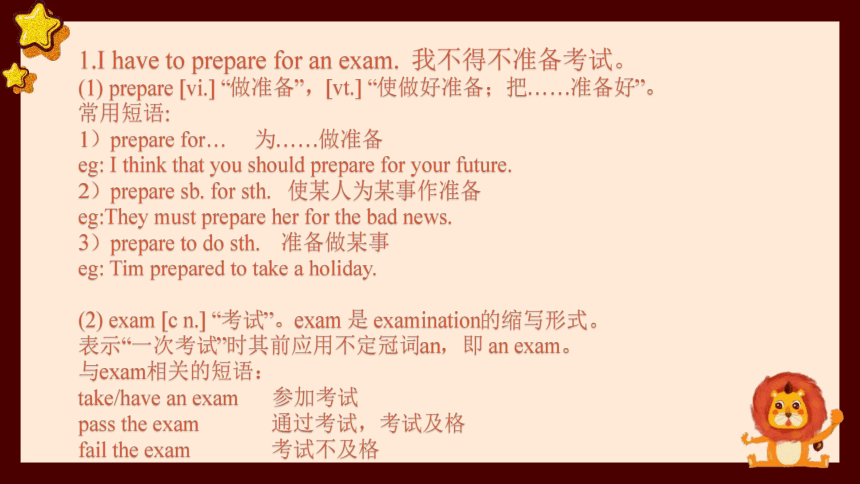
文档简介
(共36张PPT)
Unit 9
Can you come to my party
人教版八年级上册
目录
基础知识
重难点解析
语法聚焦
习题巩固
PART.01
基础知识
必 备 短 语
1. prepare for 为......做准备
2. hang out 常去某处;闲逛
3. another time 其他时间;别的时间
4. the day before yesterday 前天
5. the day after tomorrow 后天
6. look after 照料;照顾
7. turn down 拒绝
8. take a trip 去旅行
9. look forward to 盼望;期盼
10. hear from sb. 接到(某人的)信;电话
11. have the flu. 患感冒
12. come to the party 来参加聚会
13. accept an invitation 接受邀请
14. at the end of this month 在这个月末
15. reply in writing 书面回复
16. not... until 直到......
17. the opening of... ......的开幕式、 落成典礼
18. go to the concert 去听音乐会
19. study for the test 为考试学习
20. go to the doctor 去看医生
21. too much 太多的
22. have to 必须;不得不
23. be sure 确信
24. reply to 回复
25. go shopping 去购物
26. go to the party 去聚会
27. at the end of the this month 在这个月末
PART. 02
重难点解析
1. have the flu 患流感
have a/an +表示疾病的名词,“得了……病”,而flu前不用a,要用 the
flu n.“流行性感冒;流感”
短语: have the flu “患流感”
eg: He didn’t go to school because he had the flu.
表示“患病”的常用短语:
have a cold 感冒 have a cough 咳嗽
have a fever 发烧 have a sore throat 喉咙痛
have a headache 头痛 have a toothache 牙痛
2. hang out “闲逛;常去某处”
1)hang [v.] “悬挂;垂下”,其过去式为hung。
eg: He likes reading and he often hangs out in the book-shop.
hang的相关短语:
hang on紧紧抓住 hang about (在某处)闲荡 hang up挂断电话;悬挂
2). hang [v.] (被)吊死,(被)纹死”,其过去式为hanged。
3. accept [v.] “接受”。其反义词为refuse。
eg: I can accept his invitation.
1) 辨析accept &receive
accept 意为“接受” 指主观上愿意接受
receive 意为“收到” 指客观上收到或拿到,但主观上不一定会接受
eg: I received his gift yesterday, but I wouldn’t like to accept it.
4. refuse
refuse[vt.] “拒绝”,其后可接名词、代词或动词不定式作宾语,不能接动词-ing形式作宾语。
短语:refuse to do sth.意为“拒绝做某事”。
eg: You shouldn’t refuse to help her.
5. look after “照料;照顾”,= take care of。
eg: You should look after the dog well.=You should take good care of the dog.
表示“好好照顾”时,look after...well;take good care of...。
与look有关的短语:
look at 看 look for 寻找
look around 环视 look forward to 盼望;期待
look out当心;小心 look up仰视;查阅
6. turn down “拒绝” = refuse
eg: Thanks for your invitation. But I have to turn it down.
→turn down还可 表示将声音“关小;调低”。
eg: The baby is sleeping, so please turn down the radio.
→turn down为“动词+副词”型短语,当人称代词作其宾语时,人称代词要放在turn与down之间。
7. weekday
Weekday[c.n.],“工作日”,指从星期一到星期五的任何一天。
常用短语:
on weekdays “在工作日”。
eg: Don’t drink on weekdays. 工作日不要喝酒。
辨析:weekday 与 weekend
weekday 工作日 指从星期一到星期五的任何一天
weekend 周末 指星期六和星期天
→表示“在周末”常用 on weekends 或 on the weekend。
8. the day before yesterday 前天
1)the day before yesterday为“前天”,常用作时间状语,用于一般过去时。
eg: Frank invited Ted to watch an action movie the day before yesterday.
2) the day after tomorrow 意为“后天”,用于一般将来时。
eg: Mr. Brown will give us a report about environment the day after tomorrow.
→the day before yesterday, the day after tomorrow作时间状语时,前面不用介词on。
1.I have to prepare for an exam. 我不得不准备考试。
(1) prepare [vi.] “做准备”,[vt.] “使做好准备;把……准备好”。
常用短语:
1)prepare for… 为……做准备
eg: I think that you should prepare for your future.
2)prepare sb. for sth. 使某人为某事作准备
eg:They must prepare her for the bad news.
3)prepare to do sth. 准备做某事
eg: Tim prepared to take a holiday.
(2) exam [c n.] “考试”。exam 是 examination的缩写形式。
表示“一次考试”时其前应用不定冠词an,即 an exam。
与exam相关的短语:
take/have an exam 参加考试
pass the exam 通过考试,考试及格
fail the exam 考试不及格
2. I’m not available. 我没有空。
1) available [adj.] “有空的”,常作表语。其同义词free,反义词为busy或full。
eg: — Are you available tonight
— No, I’m full.
→available作形容词还可表示“可用的;可获得的”。
eg: Tickets are available from the box office.
3.Catch you on Monday! 礼拜一见!
1) catch you常用于口语中,“再见”。= See you later!(回头见!)
— I’ll give you a call in a couple of days.
— Okay. Catch you later.
2)catch [v.] “及时赶上;接住;抓住”。其第三人称单数形式为catches,过去式为caught。
eg: As long as you work hard, you will catch up with others.
3) catch相关的短语:
catch the ball 接球
catch the fish 捉鱼
catch a bus赶公交车
catch a cold 感冒
4. I would also like to invite each parent to bring one book as a gift for the new library.
1)invite [v.]“邀请” 动词-ing形式inviting。
其常见用法有:
①invite sb. to+地点名 词,表示“邀请某人去某地”。
eg: My pen mend invites me to his hometown.
②invite sb. to do sth.表示“邀请某人做某事”。
eg:Yesterday Jeff invited me to play table tennis.
→invite (v,邀请)变e为a,再加-tion (名词后缀).→(名词) invitation (邀请;请柬)
5. Jenny, can you come to my party on Saturday afternoon
1).Can you... “你能……吗?”表示邀请的重点句式。
→更礼貌的表达方式:“Could you… ”/“Would you like to”。
→接受邀请常用“Sure, I’d love to.(当然了,我愿意)”。
→婉拒绝邀请常用“Sorry, I can’t(对不起,我不能)”/“I’d love to, but”(我很愿意,但是……)”。
eg:— Can you go swimming with me this Sunday
— I’d love to, but I have to see the dentist that day.
2). on Saturday afternoon “在周六的下午”,= on the afternoon of Saturday。
→在具体的某一天或某一天的上午、下午或晚上,用介词on,而不用介词in。
eg: on the morning of May 1st 在五月一日上午
on Monday evening 在周一晚上
6. Oh, but Sam isn’t leaving until next Wednesday.
1) not...until...“直到……才……”,句中谓语动词常用非延续性动词。指until所表示的时间到了,该动作才发生。此处until用作介词,“到……时;直到……为止”,= till。
eg: The professor didn’t appear until 9:00 a.m.
He will stay on the train station until next Monday.
2) until还可用作连词,表动作、状态持续到另一动作或状态出现之前,意为“直到……为止”。
eg: He lived with his sisters until he got married.
I won’t believe you until I see it myself.
7. I’m afraid not. 恐怕不能。
I’m afraid...意为“恐怕……”,用于推测令人不愉快的事。
1)表示否定时,用I’m afraid not. “恐怕不能”;
2)表示肯定时,用I’m afraid so.“恐怕如此”。
— Can you go to the cinema
— Sorry. I’m afraid not.
— Is he very ill
— I’m afraid so.
4. She helped me to improve my English so much. 她帮助我把英语提高了那么多。
1) so much “如此多”,可修饰动词,作状语;其后也可接不可数名词。
eg: There was so much noise inside.
2) so much 与 so many
so much 如此多 后接不可数名词 so much money 这么多钱
so many 如此多 后接可数名词复数 so many friends 这么多朋友
8. A: What’s today 今天是什么日子?
B: It’s Monday the 14th. 今天是14号,星期一。
1) What’s today 用来提问今天是几号、星期几。回答时,通常用星期和日期,一般星期在前,日期在后。
— What’s today
— It’s Tursday, November 6th.
① What’s the date today 意为“今天是几月几号?”回答要用日期。
— What’s the date today
— It’s September 9th.
② What day is it today 意为“今天是星期几?”回答要用星期几。
— What day is it today
— It’s Friday.
9. I’m sad to see her go f and this party is the best way to say “Thank you and goodbye.”
1).sad adj.“(令人)悲哀的;(令人)难过的”。
eg: She seems sad. What happened to her
→sadness n.“悲伤;悲痛”
→sadly adv. “伤心地;悲伤地”
2). see sb. do sth,表示“看到某人做某事”。
eg: I often see the boy play football in the park.
3) see sb. doing sth.& see sb. do sth.
see sb. doing sth. 看见某人正在做某事 I see her crying the classroom.
see sb. do sth. 看见某人做某事 I often see her draw a picture.
10. My family is taking a trip to Wuhan at the end of this month to visit my aunt and uncle.
1) take a trip意为“去旅行”。
eg: Are you planning to take a trip next week
2) at the end of 意为“在……的末尾;在…… 尽头”,可以表示地点,也可以表示时间。
eg: You can see a shop at the end of the street.
At the end of the week, they’ll have an exam.
3) by the end of...意为“到……末为止”。
eg: We’ll finish ten percent of the work by the end of this month.
4) in the end 意为“最后;终于”,常在句中作状语,可置于句首或句末,与at last或finally同义。
eg: He found the schoolbag in the end.
11. However, I’d still be glad to help out with any of the party
preparations, like planning the games.
1) be glad to do sth.意为“高兴做某事”。
eg: I’m glad to hear from you.
2) help out意为“(帮助……)分担工作、解决难题”。
eg:Do you need anyone to help out in the store
3) preparation名词,意为“准备;准备工作”.
eg: We made preparations to move to new house.
→prepare (准备)-e + ation→preparation (n. 准备)
12. Bring Steen to the party without telling her so that she can be surprised.
1) without prep.“没有;不(做某事)“。其后可跟动词-ing形式、人称代词宾格或名词,用来表示伴随或假设的情况。
→without doing sth.“没有做某事”。
→without的反义词为with “具有;带有”。
eg:She left the home without saying a word.
Life is important. Without it, everything becomes meaningless.
→一般情况下,含有without的句子可以和含有结构的句子进行同义句转换。
eg: I couldn’t finish the task without your help=If you didn’t help me, I couldn’t finish the task.
2) so that意为“以便;为的是”,此处引导目的状语从句。
eg: I study hard every day so that I can catch up with Tim.
→so that=in order to 只是前者跟句子,后者跟动词原形。
eg: He practices every day so that he can make the soccer team. = He practices every day in order to make the soccer team.
→so...that...意为“如此……以至于……”,引导结果状语从句。
eg: The movie is so educational that we want to see it again.
3) surprised形容词,意为“感到意外的;惊奇的”。
短语:be surprised to do sth. 为“对做某事感到意外”。
eg: I was surprised to receive her invitation.
→辨析surprised,surprising 与 surprise
①surprised adj. “感到意外的;惊奇的”,常作表语,主语为人
②surprising adj. “令人惊讶的”,作表语或定语,常用来说明或修饰事物
③surprise n./v. 惊奇,惊讶/ 使吃惊
13. I look forward to hearing from you all.
1)look forward to“期待;盼望”,其中to为介词,其后可跟名词、代词或动词-ing形式作宾语。
eg: Cindy is looking forward to her birthday party.
→look forward to & expect 二者都可意为"期待"
①look forward to指带着愉快的心情期待着某事的发生。
eg: The students are looking forward to their holiday.
②expect指确信某事必将发生,多用于好的事物,也可用于不好的事物。
eg: I didn’t expect to meet you here.
2)hear from sb.“收到某人的信、电话等” = receive a letter/ telephone call from sb.。
→write (a letter) to sb.,“给某人写信”;
→give a telephone call to sb.“给某人打电话”。
eg:I heard from my mother last week.=I received a letter from my mother last week.
Kate writes to her parents once a month.
→hear of=hear about 意为“听说”
eg: I heard of the story.
14. Please reply in writing to this invitation by Friday, December 20th.
1) reply vi. “回答;答复”。 其第三人称单数形式为replies,过去式为replied。 其同义词为answer。
eg: I asked him where she was going, but she didn’t reply.
Did he reply to you
→reply n.“回答;答复”。
eg: I asked her, but she gave no reply.
2)辨析reply & answer
①reply:指用口头或书面形式回答。作不及物动词时,常与to搭配,reply to...意为 “对……作出回答”。作及物动词时,意为“回答;回答说”
②answer:是普通用语,包括用口头、书面或行动回答。既可作及物动词也可作不及物动词
3)介词by在此表示时间“不迟于,到……时为止”或“在……之前”。
eg:Can you finish the homework by tomorrow
15. What a great idea!
通常由what或how引导感叹句的句型结构如下:
What引导的感叹句:
(1)What a(an)+形容词+可数名词的单数形式+主语+谓语!
eg: What a good match it is!
(2)What+形容词+可数名词的复数形式+主语+谓语!
eg: What interesting story books the children are reading!
(3)What+形容词+不可数名词+主语+谓语!
eg: What important news it is! 多重要的新闻啊!
How引导的感叹句:
(1)How+形容词或副词+主语+谓语!
eg: How tall the boy is!
(2) How+形容词+a(an)+可数名词的单数形式+主语+谓语!
eg: How heavy a case we are carrying!
(3) How+主语+谓语!
eg:How time flies!
PART. 03
语法聚焦
情态动词can
情态动词can除了表示能力、许可或猜测之外,还可以表示邀请;could较can更礼貌、委婉。
情态动词can表示邀请时的用法如下:
1.当用情态动词can发出邀请时,要用其一般疑问句形式,其句式为:Can+主语+动词原形+其他?
eg: Can you come to the concert
1.当用情态动词can发出邀请时,其回答分为两类。
一类表示接受邀请,另一类表示拒绝邀请。
(1)常见的表示接受邀请的回答:
Sure, I’d love to. 当然,我很乐意。
Yes, I’d love to. 是的,我很乐意。
答语中I’d love to中的to不可以省略。
Sure, I think he/she/they will.
(2)常见的表示拒绝邀请的回答:
Sorry. I’m not available.
I’m sorry. Tm not free this weekend. I have to look after my sister.
I’d Love to, but I’m afraid I can’t. I have to study for an English test.
向别人发出邀请、请求、建议或征求别人的意见,还有几种表达方式,语气比较委婉,显得客气而有礼貌。
句型结构 含义 例句
Let’s + do sth. 咱们做某事吧。 Let’s go shopping.
Shall we + do sth. 我们做某事好吗? Shall we go out for a walk
Would you mind (not) + doing sth. 你介意(不)做某事吗? Would you mind closing the door
How/What about doing sth. 做某事怎么样? How about playing basketball
You’d better (not) do sth. 你最好(不要)做某事。 You’d better not read such books.你最好不要看这样的书。
Why don’t you do sth. Why not do sth. (你)为什么不做某事呢? Why don’t you ask your teacher =Why not ask your teacher
Would you like (not) to do sth. 你愿意(不)做某事吗? Would you like to have a rest
Would/Could you please (not) do sth. 请你(不要)做某事好吗? Would you please wait for me
1. —May I watch TV, Dad
—When your homework is finished, you ________
A. should B. can C. must
2. —Can we play soccer here
—No, you __________play it near the road. That’s too dangerous!
A. mustn’t B. may C. won’t
3. —How amazing this robot is!
—Wow, it has video cameras in its eyes, so it “see” and interact with people.
A. may B. can C. must
4. — I finish my work now
— No, you . You can do it later.
A. May, needn't B. Must, don’t have to C. Can, couldn’t
5. The TV news reports that there ________ a storm the day after tomorrow
A. is B. was C. will be
6.—How do you usually go to school
—My school is far away. I ________ take the bus to school.
A. must B. might C. have to
7.— I wonder if this smart phone is Mary’s.
—It _______ belong to her. _______ is totally different from this one.
A. mustn’t; Her B. can’t; Her C. can’t; Hers
8. —Do you have any plans for tonight
—Yes , I____ at the new Italian restaurant in town.
A. eat B. have eaten C. am going to eat
9. —Look at the young lady in red. Is it Mrs. King?
—No, It ________ be her. She is wearing a white dress today.
A. can B. may C. can’t
10. —Hi .Jack! Could you come to our English party
—Sorry, I ________. I have to look after my little sister at home.
A. must B. could C. can’t
PART. 04
习题巩固
1. —Will you stay for some more days
—Sorry, I_____. My mother called to ask me to go back at once.
A. mustn’t B. may not C. can’t D. wouldn’t
2. —How many English words do you think I should know
—As many as you ______. Then you will find reading quite easy.
A. will B. must C. can D. might
3. Hurry up,or you _______catch the train.
A. can’ t B. needn’t C. mustn't D. shouldn’t
4. ---Pauline has lost her phone.
---No. It’s in her bag. I _________ hear it.
A. must B. can C. may D. shall
5. —Look at the young lady in red. Is it Mrs. King
—No. It _____ be her. She is wearing a white dress today.
A. can B. may C. must D. can’t
6. —Difficulties always go with me!
—Cheer up! If God closes a door in front of you, there ______ be a window opened for you.
A. would B. must C. could D. can
7. —Is that girl Susan
— It _________ be her. She left for Beijing yesterday.
A. needn't B. can't C. mustn't D. can
8. —Must I finish my homework now
—No, you ______. You can go home now.
A. needn’t B. mustn’t C. shouldn’t D. can’t
9. — Look at the boy playing basketball on the ground. Is it George
— It ______ be him. He told me he would play basketball after class, but he’s not sure.
A. mustn’t B. must C. can’t D. may
10. The woman who is talking with Mr. Brown ______ be Miss Li. She has gone to England.
A. can’t B. must C. may D. mustn’t
谢谢欣赏
Unit 9
Can you come to my party
人教版八年级上册
目录
基础知识
重难点解析
语法聚焦
习题巩固
PART.01
基础知识
必 备 短 语
1. prepare for 为......做准备
2. hang out 常去某处;闲逛
3. another time 其他时间;别的时间
4. the day before yesterday 前天
5. the day after tomorrow 后天
6. look after 照料;照顾
7. turn down 拒绝
8. take a trip 去旅行
9. look forward to 盼望;期盼
10. hear from sb. 接到(某人的)信;电话
11. have the flu. 患感冒
12. come to the party 来参加聚会
13. accept an invitation 接受邀请
14. at the end of this month 在这个月末
15. reply in writing 书面回复
16. not... until 直到......
17. the opening of... ......的开幕式、 落成典礼
18. go to the concert 去听音乐会
19. study for the test 为考试学习
20. go to the doctor 去看医生
21. too much 太多的
22. have to 必须;不得不
23. be sure 确信
24. reply to 回复
25. go shopping 去购物
26. go to the party 去聚会
27. at the end of the this month 在这个月末
PART. 02
重难点解析
1. have the flu 患流感
have a/an +表示疾病的名词,“得了……病”,而flu前不用a,要用 the
flu n.“流行性感冒;流感”
短语: have the flu “患流感”
eg: He didn’t go to school because he had the flu.
表示“患病”的常用短语:
have a cold 感冒 have a cough 咳嗽
have a fever 发烧 have a sore throat 喉咙痛
have a headache 头痛 have a toothache 牙痛
2. hang out “闲逛;常去某处”
1)hang [v.] “悬挂;垂下”,其过去式为hung。
eg: He likes reading and he often hangs out in the book-shop.
hang的相关短语:
hang on紧紧抓住 hang about (在某处)闲荡 hang up挂断电话;悬挂
2). hang [v.] (被)吊死,(被)纹死”,其过去式为hanged。
3. accept [v.] “接受”。其反义词为refuse。
eg: I can accept his invitation.
1) 辨析accept &receive
accept 意为“接受” 指主观上愿意接受
receive 意为“收到” 指客观上收到或拿到,但主观上不一定会接受
eg: I received his gift yesterday, but I wouldn’t like to accept it.
4. refuse
refuse[vt.] “拒绝”,其后可接名词、代词或动词不定式作宾语,不能接动词-ing形式作宾语。
短语:refuse to do sth.意为“拒绝做某事”。
eg: You shouldn’t refuse to help her.
5. look after “照料;照顾”,= take care of。
eg: You should look after the dog well.=You should take good care of the dog.
表示“好好照顾”时,look after...well;take good care of...。
与look有关的短语:
look at 看 look for 寻找
look around 环视 look forward to 盼望;期待
look out当心;小心 look up仰视;查阅
6. turn down “拒绝” = refuse
eg: Thanks for your invitation. But I have to turn it down.
→turn down还可 表示将声音“关小;调低”。
eg: The baby is sleeping, so please turn down the radio.
→turn down为“动词+副词”型短语,当人称代词作其宾语时,人称代词要放在turn与down之间。
7. weekday
Weekday[c.n.],“工作日”,指从星期一到星期五的任何一天。
常用短语:
on weekdays “在工作日”。
eg: Don’t drink on weekdays. 工作日不要喝酒。
辨析:weekday 与 weekend
weekday 工作日 指从星期一到星期五的任何一天
weekend 周末 指星期六和星期天
→表示“在周末”常用 on weekends 或 on the weekend。
8. the day before yesterday 前天
1)the day before yesterday为“前天”,常用作时间状语,用于一般过去时。
eg: Frank invited Ted to watch an action movie the day before yesterday.
2) the day after tomorrow 意为“后天”,用于一般将来时。
eg: Mr. Brown will give us a report about environment the day after tomorrow.
→the day before yesterday, the day after tomorrow作时间状语时,前面不用介词on。
1.I have to prepare for an exam. 我不得不准备考试。
(1) prepare [vi.] “做准备”,[vt.] “使做好准备;把……准备好”。
常用短语:
1)prepare for… 为……做准备
eg: I think that you should prepare for your future.
2)prepare sb. for sth. 使某人为某事作准备
eg:They must prepare her for the bad news.
3)prepare to do sth. 准备做某事
eg: Tim prepared to take a holiday.
(2) exam [c n.] “考试”。exam 是 examination的缩写形式。
表示“一次考试”时其前应用不定冠词an,即 an exam。
与exam相关的短语:
take/have an exam 参加考试
pass the exam 通过考试,考试及格
fail the exam 考试不及格
2. I’m not available. 我没有空。
1) available [adj.] “有空的”,常作表语。其同义词free,反义词为busy或full。
eg: — Are you available tonight
— No, I’m full.
→available作形容词还可表示“可用的;可获得的”。
eg: Tickets are available from the box office.
3.Catch you on Monday! 礼拜一见!
1) catch you常用于口语中,“再见”。= See you later!(回头见!)
— I’ll give you a call in a couple of days.
— Okay. Catch you later.
2)catch [v.] “及时赶上;接住;抓住”。其第三人称单数形式为catches,过去式为caught。
eg: As long as you work hard, you will catch up with others.
3) catch相关的短语:
catch the ball 接球
catch the fish 捉鱼
catch a bus赶公交车
catch a cold 感冒
4. I would also like to invite each parent to bring one book as a gift for the new library.
1)invite [v.]“邀请” 动词-ing形式inviting。
其常见用法有:
①invite sb. to+地点名 词,表示“邀请某人去某地”。
eg: My pen mend invites me to his hometown.
②invite sb. to do sth.表示“邀请某人做某事”。
eg:Yesterday Jeff invited me to play table tennis.
→invite (v,邀请)变e为a,再加-tion (名词后缀).→(名词) invitation (邀请;请柬)
5. Jenny, can you come to my party on Saturday afternoon
1).Can you... “你能……吗?”表示邀请的重点句式。
→更礼貌的表达方式:“Could you… ”/“Would you like to”。
→接受邀请常用“Sure, I’d love to.(当然了,我愿意)”。
→婉拒绝邀请常用“Sorry, I can’t(对不起,我不能)”/“I’d love to, but”(我很愿意,但是……)”。
eg:— Can you go swimming with me this Sunday
— I’d love to, but I have to see the dentist that day.
2). on Saturday afternoon “在周六的下午”,= on the afternoon of Saturday。
→在具体的某一天或某一天的上午、下午或晚上,用介词on,而不用介词in。
eg: on the morning of May 1st 在五月一日上午
on Monday evening 在周一晚上
6. Oh, but Sam isn’t leaving until next Wednesday.
1) not...until...“直到……才……”,句中谓语动词常用非延续性动词。指until所表示的时间到了,该动作才发生。此处until用作介词,“到……时;直到……为止”,= till。
eg: The professor didn’t appear until 9:00 a.m.
He will stay on the train station until next Monday.
2) until还可用作连词,表动作、状态持续到另一动作或状态出现之前,意为“直到……为止”。
eg: He lived with his sisters until he got married.
I won’t believe you until I see it myself.
7. I’m afraid not. 恐怕不能。
I’m afraid...意为“恐怕……”,用于推测令人不愉快的事。
1)表示否定时,用I’m afraid not. “恐怕不能”;
2)表示肯定时,用I’m afraid so.“恐怕如此”。
— Can you go to the cinema
— Sorry. I’m afraid not.
— Is he very ill
— I’m afraid so.
4. She helped me to improve my English so much. 她帮助我把英语提高了那么多。
1) so much “如此多”,可修饰动词,作状语;其后也可接不可数名词。
eg: There was so much noise inside.
2) so much 与 so many
so much 如此多 后接不可数名词 so much money 这么多钱
so many 如此多 后接可数名词复数 so many friends 这么多朋友
8. A: What’s today 今天是什么日子?
B: It’s Monday the 14th. 今天是14号,星期一。
1) What’s today 用来提问今天是几号、星期几。回答时,通常用星期和日期,一般星期在前,日期在后。
— What’s today
— It’s Tursday, November 6th.
① What’s the date today 意为“今天是几月几号?”回答要用日期。
— What’s the date today
— It’s September 9th.
② What day is it today 意为“今天是星期几?”回答要用星期几。
— What day is it today
— It’s Friday.
9. I’m sad to see her go f and this party is the best way to say “Thank you and goodbye.”
1).sad adj.“(令人)悲哀的;(令人)难过的”。
eg: She seems sad. What happened to her
→sadness n.“悲伤;悲痛”
→sadly adv. “伤心地;悲伤地”
2). see sb. do sth,表示“看到某人做某事”。
eg: I often see the boy play football in the park.
3) see sb. doing sth.& see sb. do sth.
see sb. doing sth. 看见某人正在做某事 I see her crying the classroom.
see sb. do sth. 看见某人做某事 I often see her draw a picture.
10. My family is taking a trip to Wuhan at the end of this month to visit my aunt and uncle.
1) take a trip意为“去旅行”。
eg: Are you planning to take a trip next week
2) at the end of 意为“在……的末尾;在…… 尽头”,可以表示地点,也可以表示时间。
eg: You can see a shop at the end of the street.
At the end of the week, they’ll have an exam.
3) by the end of...意为“到……末为止”。
eg: We’ll finish ten percent of the work by the end of this month.
4) in the end 意为“最后;终于”,常在句中作状语,可置于句首或句末,与at last或finally同义。
eg: He found the schoolbag in the end.
11. However, I’d still be glad to help out with any of the party
preparations, like planning the games.
1) be glad to do sth.意为“高兴做某事”。
eg: I’m glad to hear from you.
2) help out意为“(帮助……)分担工作、解决难题”。
eg:Do you need anyone to help out in the store
3) preparation名词,意为“准备;准备工作”.
eg: We made preparations to move to new house.
→prepare (准备)-e + ation→preparation (n. 准备)
12. Bring Steen to the party without telling her so that she can be surprised.
1) without prep.“没有;不(做某事)“。其后可跟动词-ing形式、人称代词宾格或名词,用来表示伴随或假设的情况。
→without doing sth.“没有做某事”。
→without的反义词为with “具有;带有”。
eg:She left the home without saying a word.
Life is important. Without it, everything becomes meaningless.
→一般情况下,含有without的句子可以和含有结构的句子进行同义句转换。
eg: I couldn’t finish the task without your help=If you didn’t help me, I couldn’t finish the task.
2) so that意为“以便;为的是”,此处引导目的状语从句。
eg: I study hard every day so that I can catch up with Tim.
→so that=in order to 只是前者跟句子,后者跟动词原形。
eg: He practices every day so that he can make the soccer team. = He practices every day in order to make the soccer team.
→so...that...意为“如此……以至于……”,引导结果状语从句。
eg: The movie is so educational that we want to see it again.
3) surprised形容词,意为“感到意外的;惊奇的”。
短语:be surprised to do sth. 为“对做某事感到意外”。
eg: I was surprised to receive her invitation.
→辨析surprised,surprising 与 surprise
①surprised adj. “感到意外的;惊奇的”,常作表语,主语为人
②surprising adj. “令人惊讶的”,作表语或定语,常用来说明或修饰事物
③surprise n./v. 惊奇,惊讶/ 使吃惊
13. I look forward to hearing from you all.
1)look forward to“期待;盼望”,其中to为介词,其后可跟名词、代词或动词-ing形式作宾语。
eg: Cindy is looking forward to her birthday party.
→look forward to & expect 二者都可意为"期待"
①look forward to指带着愉快的心情期待着某事的发生。
eg: The students are looking forward to their holiday.
②expect指确信某事必将发生,多用于好的事物,也可用于不好的事物。
eg: I didn’t expect to meet you here.
2)hear from sb.“收到某人的信、电话等” = receive a letter/ telephone call from sb.。
→write (a letter) to sb.,“给某人写信”;
→give a telephone call to sb.“给某人打电话”。
eg:I heard from my mother last week.=I received a letter from my mother last week.
Kate writes to her parents once a month.
→hear of=hear about 意为“听说”
eg: I heard of the story.
14. Please reply in writing to this invitation by Friday, December 20th.
1) reply vi. “回答;答复”。 其第三人称单数形式为replies,过去式为replied。 其同义词为answer。
eg: I asked him where she was going, but she didn’t reply.
Did he reply to you
→reply n.“回答;答复”。
eg: I asked her, but she gave no reply.
2)辨析reply & answer
①reply:指用口头或书面形式回答。作不及物动词时,常与to搭配,reply to...意为 “对……作出回答”。作及物动词时,意为“回答;回答说”
②answer:是普通用语,包括用口头、书面或行动回答。既可作及物动词也可作不及物动词
3)介词by在此表示时间“不迟于,到……时为止”或“在……之前”。
eg:Can you finish the homework by tomorrow
15. What a great idea!
通常由what或how引导感叹句的句型结构如下:
What引导的感叹句:
(1)What a(an)+形容词+可数名词的单数形式+主语+谓语!
eg: What a good match it is!
(2)What+形容词+可数名词的复数形式+主语+谓语!
eg: What interesting story books the children are reading!
(3)What+形容词+不可数名词+主语+谓语!
eg: What important news it is! 多重要的新闻啊!
How引导的感叹句:
(1)How+形容词或副词+主语+谓语!
eg: How tall the boy is!
(2) How+形容词+a(an)+可数名词的单数形式+主语+谓语!
eg: How heavy a case we are carrying!
(3) How+主语+谓语!
eg:How time flies!
PART. 03
语法聚焦
情态动词can
情态动词can除了表示能力、许可或猜测之外,还可以表示邀请;could较can更礼貌、委婉。
情态动词can表示邀请时的用法如下:
1.当用情态动词can发出邀请时,要用其一般疑问句形式,其句式为:Can+主语+动词原形+其他?
eg: Can you come to the concert
1.当用情态动词can发出邀请时,其回答分为两类。
一类表示接受邀请,另一类表示拒绝邀请。
(1)常见的表示接受邀请的回答:
Sure, I’d love to. 当然,我很乐意。
Yes, I’d love to. 是的,我很乐意。
答语中I’d love to中的to不可以省略。
Sure, I think he/she/they will.
(2)常见的表示拒绝邀请的回答:
Sorry. I’m not available.
I’m sorry. Tm not free this weekend. I have to look after my sister.
I’d Love to, but I’m afraid I can’t. I have to study for an English test.
向别人发出邀请、请求、建议或征求别人的意见,还有几种表达方式,语气比较委婉,显得客气而有礼貌。
句型结构 含义 例句
Let’s + do sth. 咱们做某事吧。 Let’s go shopping.
Shall we + do sth. 我们做某事好吗? Shall we go out for a walk
Would you mind (not) + doing sth. 你介意(不)做某事吗? Would you mind closing the door
How/What about doing sth. 做某事怎么样? How about playing basketball
You’d better (not) do sth. 你最好(不要)做某事。 You’d better not read such books.你最好不要看这样的书。
Why don’t you do sth. Why not do sth. (你)为什么不做某事呢? Why don’t you ask your teacher =Why not ask your teacher
Would you like (not) to do sth. 你愿意(不)做某事吗? Would you like to have a rest
Would/Could you please (not) do sth. 请你(不要)做某事好吗? Would you please wait for me
1. —May I watch TV, Dad
—When your homework is finished, you ________
A. should B. can C. must
2. —Can we play soccer here
—No, you __________play it near the road. That’s too dangerous!
A. mustn’t B. may C. won’t
3. —How amazing this robot is!
—Wow, it has video cameras in its eyes, so it “see” and interact with people.
A. may B. can C. must
4. — I finish my work now
— No, you . You can do it later.
A. May, needn't B. Must, don’t have to C. Can, couldn’t
5. The TV news reports that there ________ a storm the day after tomorrow
A. is B. was C. will be
6.—How do you usually go to school
—My school is far away. I ________ take the bus to school.
A. must B. might C. have to
7.— I wonder if this smart phone is Mary’s.
—It _______ belong to her. _______ is totally different from this one.
A. mustn’t; Her B. can’t; Her C. can’t; Hers
8. —Do you have any plans for tonight
—Yes , I____ at the new Italian restaurant in town.
A. eat B. have eaten C. am going to eat
9. —Look at the young lady in red. Is it Mrs. King?
—No, It ________ be her. She is wearing a white dress today.
A. can B. may C. can’t
10. —Hi .Jack! Could you come to our English party
—Sorry, I ________. I have to look after my little sister at home.
A. must B. could C. can’t
PART. 04
习题巩固
1. —Will you stay for some more days
—Sorry, I_____. My mother called to ask me to go back at once.
A. mustn’t B. may not C. can’t D. wouldn’t
2. —How many English words do you think I should know
—As many as you ______. Then you will find reading quite easy.
A. will B. must C. can D. might
3. Hurry up,or you _______catch the train.
A. can’ t B. needn’t C. mustn't D. shouldn’t
4. ---Pauline has lost her phone.
---No. It’s in her bag. I _________ hear it.
A. must B. can C. may D. shall
5. —Look at the young lady in red. Is it Mrs. King
—No. It _____ be her. She is wearing a white dress today.
A. can B. may C. must D. can’t
6. —Difficulties always go with me!
—Cheer up! If God closes a door in front of you, there ______ be a window opened for you.
A. would B. must C. could D. can
7. —Is that girl Susan
— It _________ be her. She left for Beijing yesterday.
A. needn't B. can't C. mustn't D. can
8. —Must I finish my homework now
—No, you ______. You can go home now.
A. needn’t B. mustn’t C. shouldn’t D. can’t
9. — Look at the boy playing basketball on the ground. Is it George
— It ______ be him. He told me he would play basketball after class, but he’s not sure.
A. mustn’t B. must C. can’t D. may
10. The woman who is talking with Mr. Brown ______ be Miss Li. She has gone to England.
A. can’t B. must C. may D. mustn’t
谢谢欣赏
同课章节目录
- Unit 1 Where did you go on vacation?
- Section A
- Section B
- Unit 2 How often do you exercise?
- Section A
- Section B
- Unit 3 I'm more outgoing than my sister.
- Section A
- Section B
- Unit 4 What's the best movie theater?
- Section A
- Section B
- Unit 5 Do you want to watch a game show?
- Section A
- Section B
- Unit 6 I'm going to study computer science.
- Section A
- Section B
- Unit 7 Will people have robots?
- Section A
- Section B
- Unit 8 How do you make a banana milk shake?
- Section A
- Section B
- Unit 9 Can you come to my party?
- Section A
- Section B
- Unit 10 If you go to the party, you'll have a grea
- Section A
- Section B
